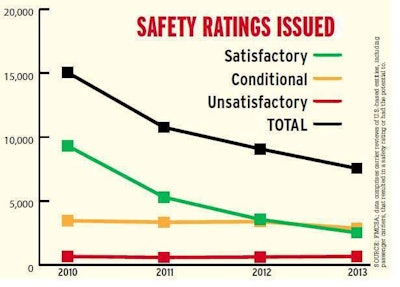
TIA urged its members to voice support for an amendment it says will be offered by Representative Jimmy Duncan (R-Tenn.) on the House floor this week. The amendment would change the language of the bill that specifies selection criteria to include only Satisfactory-rated carriers as those safe to do business with. It would add “Unrated” carriers to that list, too, which TIA says is a win for small trucking businesses. The bill and proposed amendments could see action on the House floor this week.
“The Duncan amendment clarifies that motor carriers who have not been prioritized for a compliance review by FMCSA due to their safe operations are equal in safety status to satisfactory-rated carriers,” TIA’s call to action specifies. The amendment would add Unrated carriers to the mix. The majority of motor carriers, including many independent owner-operators and others among the smallest carriers, are officially Unrated today.

“This amendment is necessary,” TIA says, “to ensure that 447,665 unrated carriers, who are mostly small family-owned businesses, are not penalized by a flawed federal safety rating system.”
The Owner-Operator Independent Drivers Association supports the change in language, according to reporting in OOIDA’s own Land Line magazine Friday, Oct. 30, which the story notes would “shut out ‘unsatisfactory’ rated motor carriers from hauling freight.”
It would, however, also shut out Conditional-rated carriers.
The proposed change does not go as far as the original language of the “hiring standard” provision as introduced by Duncan in 2014 and then supported by TIA, as previously reported. The original language would have required parties contracting with motor carriers to ensure that the carrier had active authority, the required insurance and hadn’t been given an Unsatisfactory safety rating to avoid liability in “negligent selection” lawsuits.
A return to that basic statement of law as it stands was urged by a range of groups from the Western States Trucking Association to the Alliance for Safe, Effective, and Competitive Truck Transportation. They would replace the entire “Interim Hiring Standard” provision with this “affirmation of existing law”:
Unless a motor carrier in the SMS has received an UNSATISFACTORY safety rating pursuant to 49 CFR Part 385, or has otherwise been ordered to discontinue operations by the FMCSA, it is authorized to operate on the nation’s roadways and therefore fit for the shipping public to use.”
As it stands, the language being pushed by Duncan and TIA notably excludes Conditional-rated carriers. Between fiscal year 2011 and the most recently published data available at FMCSA.dot.gov for FY 2015, the agency and its state partners have performed 14,673 compliance reviews that have resulted in the Conditional rating.
 This chart, from July 2014 reporting on the current safety rating system, shows that since the advent of the CSA program, the Federal Motor Carrier Safety Administration has become much less likely to issue ratings. Of reviews of U.S. carriers in the then most recent complete fiscal year, 2013, about 76 percent of reviews that could have resulted in a safety rating actually did so. Compare that to the final pre-CSA year of 2010, when the percentage of ratable reviews was 87 percent. (Full FY 2014 numbers showed the trend stabilizing, with 75 percent of all reviews resulting in a safety rating; and, once again, more Conditional ratings were issued than Satisfactory ones.) Furthermore, the overall number of intensive carrier reviews – the kind that result in safety ratings – in 2010 was twice as high as the number conducted in 2013. That’s because the agency has shifted away from the traditional compliance review to greater reliance on more focused reviews and away from a safety-rating approach. Transportation attorney Hank Seaton has contended FMCSA has shifted accountability for determining carrier safety “from itself onto the shippers and brokers,” an attempt to “strong-arm the public” into doing the agency’s job.
This chart, from July 2014 reporting on the current safety rating system, shows that since the advent of the CSA program, the Federal Motor Carrier Safety Administration has become much less likely to issue ratings. Of reviews of U.S. carriers in the then most recent complete fiscal year, 2013, about 76 percent of reviews that could have resulted in a safety rating actually did so. Compare that to the final pre-CSA year of 2010, when the percentage of ratable reviews was 87 percent. (Full FY 2014 numbers showed the trend stabilizing, with 75 percent of all reviews resulting in a safety rating; and, once again, more Conditional ratings were issued than Satisfactory ones.) Furthermore, the overall number of intensive carrier reviews – the kind that result in safety ratings – in 2010 was twice as high as the number conducted in 2013. That’s because the agency has shifted away from the traditional compliance review to greater reliance on more focused reviews and away from a safety-rating approach. Transportation attorney Hank Seaton has contended FMCSA has shifted accountability for determining carrier safety “from itself onto the shippers and brokers,” an attempt to “strong-arm the public” into doing the agency’s job.As was discussed in-depth in 2014 reporting as part of Overdrive‘s “CSA’s Fallout” series, carriers saddled with the Conditional rating, though authorized to continue operating, increasingly find it difficult to obtain a follow-up review from FMCSA after receiving a Conditional rating and making changes to correct problems found. A follow-up review is virtually the only way they can achieve or return to Satisfactory status.
As FMCSA has put more emphasis on the CSA Safety Measurement System as its primary oversight tool, as previously reported, “the agency essentially has abandoned old policies that prioritized follow-up Conditional carrier reviews.”
Find further reading about the situation of Conditional carriers in the following linked story.










